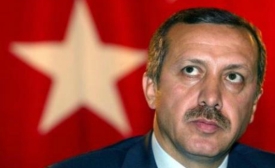turkish-armenian relations
In March 2003, Recep Tayyip Erdogan became the Prime Minister of Turkey, replacing Abdullah Gul; the latter took the post of the Foreign Minister. Meanwhile, Ahmet Davutoglu was invited to become the Prime Minister’s chief foreign policy adviser. This triumvirate would shape Turkish foreign policy for the next decade. The “Armenian opening” was one of the most challenging tasks for these foreign policy makers of Ankara.
A hundred years later, dance is being used as a bridge over the century-old abyss between Turks and Armenians. DanceMotion USA, a cultural diplomacy initiative sponsored by the U.S. State Department’s Bureau of Educational and Cultural Affairs and produced by BAM, facilitated a contemporary dance collaboration among artists from the three nations.
Armenians are feeling concerned over Prime Minister Recep Tayyip Erdoğan's presidential candidacy and believe that placing centralized power in his hands is a potential threat to the safety and security of Armenians, given his divisive manner of ruling.
During the last decade Turkey, as a young republic and budding democracy, has demonstrated its ability to contain political crises and domestic discontent. The country still has a long way to go, but there are at least signs of shifts in the government’s attitude and a political will to move forward, manifesting in gradual but permanent changes.

On the implications of the Turkish Prime Minister's recent statement.







